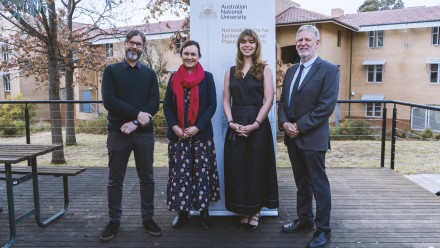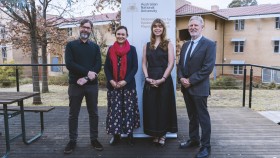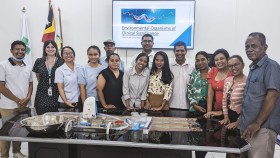Survive or thrive? The need for ambitious climate change and human health policies in Australia
Share
The lack of national policy addressing the threat of climate change on human health means that Australians remain at significant risk, according to the 2019 MJA-Lancet Countdown report, which was launched in Australia at ANU on Friday.
Climate change remains the biggest global health threat of our time. It exacerbates existing health risks from extreme weather events, such as heatwaves, floods, droughts, and bushfires, as well as the slow-burning indirect effects on health from vector-borne diseases, changes in allergens and air pollution, and compromised food and water security.
“The MJA-Lancet Countdown report provides a national picture of what we have and have not achieved in 2019,” says Professor Sotiris Vardoulakis from the Research School of Population Health, and chair of the launch event.
“The report has a clear message. We haven’t done enough, and need to act quickly to prevent significant health risks to current and future generations.”
Of particular urgency is the transition from fossil fuels to renewable energy across all economic sectors. While there has been some progress in this area, Australia remains the world’s largest net exporter of coal and natural gas, and our electricity generation from renewable energy sources is low compared to other rich countries. Not only do coal fired power stations contribute to climate change, they also directly harm public health by emitting toxic substances to the air, land and water, with health impacts costing around $2.6 billion per year in Australia.
The report also stresses the importance of developing a national climate change and health strategy.
“The major constraint in Australia isn’t technical or knowledge-based, it’s the political and social will to take action,” says Vardoulakis. “We need to be proactive. We need to plan our adaptation and mitigation strategies now. Many of these strategies will bring immediate public health benefits, for example through improved local air quality, more urban green spaces, better cycling and walking infrastructure, and healthier diets.”
The frequency and intensity of extreme heat events has been increasing over recent decades and have killed more people in Australia than other natural hazards combined. Dubbed a ‘silent killer’, The MJA-Lancet Countdown report concludes that the intensity of heatwaves has increased by about 33% in the past twenty years. There is also a strong link between higher temperatures and elevated suicide rates.
The MJA-Lancet countdown provides a comprehensive baseline that details where we are now, and clearly defines where priority action needs to be taken.
“This report is an important resource that not only provides evidence for action, but holds us accountable for any lack of action,” says Vardoulakis. “We have a choice now: to ignore the problem and face a future which we know will be grim. Or to embrace this opportunity and be part of the solution for future generations.”
Download your copy of the MJA-Lancet Countdown to find out more about Australia’s progress on climate change and health.
You can also download the global report here.
*** The Lancet Countdown is a multi-institutional collaboration that examines the progress on climate change and health at a global scale. Australia adds to this comprehensive coverage as the only country to publish a national level countdown report, tracking progress on 31 indicators, including two new ones on wildfire exposure, engagement in health and climate change in the corporate sector, across five broad domains. ANU was proud to host the first Australian based event, chaired by Professor Sotiris Vardoulakis from the ANU Research School of Population Health, to launch this report.
The Research School of Population Health would like to thank the speakers and panel members at the launch, including:
- Dr Ying Zhang, MJA-Lancet Countdown report co-author, Senior Lecturer, Sydney School of Public Health, University of Sydney
- Dr Ivan Hanigan, MJA-Lancet Countdown report co-author, Data Scientist (Epidemiology), Sydney School of Public Health, University of Sydney
- Professor Russell Gruen, Dean of the College of Health and Medicine, ANU
- Professor Mark Howden, Director of the Climate Change Institute, ANU
- Professor Sharon Friel, Director of the School of Regulation and Global Governance, ANU
- Dr Arnagretta Hunter, Clinical Senior Lecturer, ANU Medical School
- Professor Kate Auty, ACT Commissioner for Sustainability and the Environment
- Dr Nick Watts, Executive Director at Lancet Countdown, UCL
- Ms Georgia Behrens, Global Health Vice-Chair, Australian Medical Student Association











